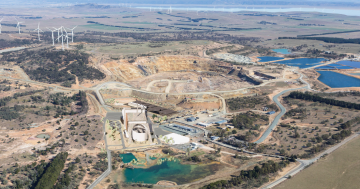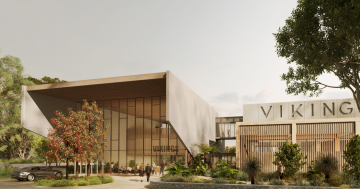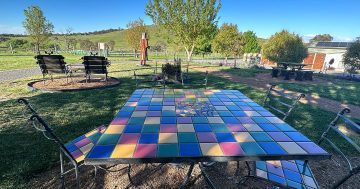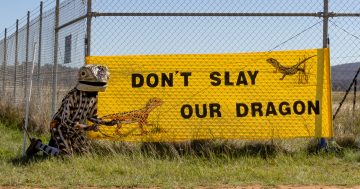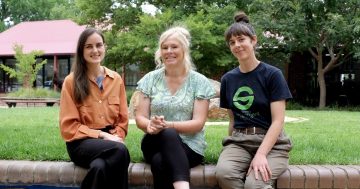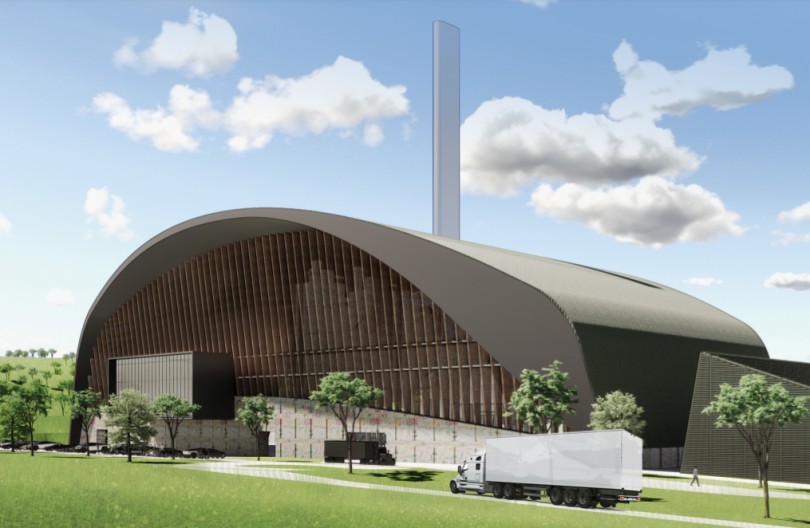
An artist’s impression of the proposed Advanced Energy Recovery Centre upon completion. Photo: Veolia.
After listening to passionate pleas from the community, Queanbeyan-Palerang Regional Council has become the third local council to denounce Veolia’s Woodlawn Advanced Energy Recovery Centre proposed for Tarago.
The project, otherwise known as the Tarago Incinerator, is located about 30 km from Bungendore.
At a QPRC-convened public meeting, councillors listened to an information report from council staff and speeches from community members likely to be impacted by the project.
One presenter was Bungendore local Laura Bardell.
Ms Bardell noted deteriorating air quality in the region, significant lead contamination in her garden caused by long-gone mining practices along the railway line and the recent bushfires. She revealed her concerns regarding the impact this had already had on her and her children.
Ms Bardell explained her son’s concern that the strawberries they grow would be toxic and that it was something he warned others of as he proudly followed his mum around putting letters in mailboxes looking to prevent the project. She wanted the council to understand the significance of their decision.
“Your choices and actions around this proposal will have impacts for years and generations to come. So please, do the right thing and protect our children from the impacts of waste incineration,” Ms Bardell said.
Lyndsey Pastega was another Bungendore local to present. She claimed that she had not met a single person who thought the incinerator would be a good thing for the region and expressed her belief that the incinerator required a regional response rather than a decision made in the city.
“I feel angry that once again our state government representatives in the Sydney area have placed such little value on the lives and livelihoods of country people,” said Ms Pastega.
“The Tarago community already pays a heavy price for the people of Sydney and processes 40 per cent of their waste at the current facility and suffers from the impact on a daily basis of the leaky containers, the foul-smelling odour, the toxic fumes and now the anxiety of this proposal.”
Ms Pastega said that with her proximity to the incinerator and from her own research of similar projects in Europe, she believes that her homegrown vegetables will become inedible, her tank water undrinkable and her children could no longer play safely in the yard should the project go ahead.
She quoted the infrastructure plan as evidence to support her belief that there was no way the project could be considered entirely safe.
The plan includes the observation that “the population can still experience health impacts when emissions are below the national standards and for some common air pollutants there is no safe threshold”.
She said there’s no evidence the project could be considered entirely safe.
Fiona Jeffery was a presenter from outside the region but in the Tarago footprint. She failed to hold back tears as she spoke of how and why she only recently moved to the area and what this proposal has meant for her.
“My husband and I moved out near Tarago because I’ve been very sick for the past seven years. We were looking to move away from the stress of a city lifestyle where we could recuperate after the toll that serious illness has had on our family,” said Ms Jeffery.
“You can imagine the immense strain that we felt after we learned of the incinerator proposal last year.
“There hasn’t been a single day in the past six months where I haven’t worried about what will happen to my family if Veolia is allowed to build the incinerator.”
After hearing several more presentations, the councillors resolved unanimously to declare their objection to the proposal. They also agreed that they would continue to work with Veolia through their representatives on the Woodlawn Eco-precinct Community Liaison Committee and make a submission on the Environmental Impact Statement once it is released for public comment.
The Queanbeyan-Palerang Council follow the Goulburn-Mulwaree and Yass Valley Council’s public opposition to the project. It is understood that the community group against the project is eager to get more councils on board.
A spokesperson for Veolia said the energy from waste technology is globally proven to be safe and more sustainable than landfilling.












